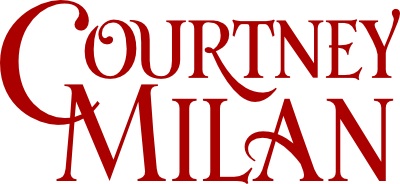The first thing I saw this morning on Twitter was a link to an article about e-book sales in the New York Times.
This link, oft-retweeted, was usually mentioned alongside an admonishment to a Kindle owner named Ms. Englin. Ms. Englin’s offense?
Exploiting a loophole in Amazon’s system, Ms. Englin has linked her Kindle to the Amazon account of some nearby friends, allowing all of them to read books like “The Lost Symbol†at the same time — while paying for them only once. “I read much more, I tend to read faster for some reason, and I read a greater variety of things,†said Ms. Englin, adding that this is nearly the same as lending a physical book to friends. “We haven’t really looked closely at Amazon’s terms of service. But I do suspect we are breaking the rules.â€
This is not called stealing. It is not even in violation of Amazon’s terms of service. Let’s go take a look at a book that I love–Eloisa James’s A Duke of Her Own–on Kindle. (For some reason, Amazon seems to believe that this book was written by Lorraine Heath. Not the case, Amazon.) Scroll down to the product details, where you’ll see this lovely line:
Simultaneous Device Usage: Up to 5 simultaneous devices, per publisher limits.
See that? What that means is that you can download this book five times. So if you had a Kindle 1, and downloaded it there; and then you got a Kindle 2, and downloaded the book there, and then got a Kindle DX, and downloaded it again, and then used the Kindle for iPhone app, and downloaded it again, and then replaced your iPhone with the iPhone 3GS–you, as a consumer, would not be able to re-download the content for a sixth time, simply by virtue of your being an early, regular adopter of content. If you wanted it again, you would have to purchase a second copy.
It also means, though, that if I purchased two Kindles–one for me, and one for my husband–we could read the same books while only paying for them once. Check your horror quotient there: How do you feel about that? Feel like we’ve done anything wrong? I hope not, because it would be silly to say that me and my husband couldn’t share digital books.
In order to link a Kindle to an account, you need to share an Amazon account. That doesn’t just give someone the right to download the books you’ve purchased; it gives them the right to buy books on your credit card. Linking someone to your Amazon account is in no way like putting a file on a file-sharing site. It gives them the right to purchase Selected Nuclear Materials and Engineering Systems (Part 4) for $6270.42, and stick you with the bill. In other words, linking accounts is an act of trust, limited by good sense (and the digital rights restrictions the publishers place on their products) to good friends and close family.
This is not stealing. It is not cheating. It is not piracy. It is the time-honored, all-important act of sharing books with a few trusted friends.
As authors, I think it is easy to jump on top of people for not paying for a book. But keep in mind that the value a book has is not just in the act of reading it. It’s also–hugely so–in the act of sharing it. In giving a book to a friend and waiting breathlessly to see if she loves it as much as you do. In reading a book someone else has recommended, and figuring out why it does (or doesn’t) work for you. Books are about building community, and if we undercut that community as authors, we take value away from our books.
In a world where the price of books appears to be in free-fall, that’s not an outcome that anyone desires. So authors, please, before calling your readers thieves, think carefully: is it really theft, or is it just part of the natural and inherent value of a book? And if you insist that that value be taken away, what price do you think your books will support?
(I edited this post in tiny part to clear up an antecedent.)
